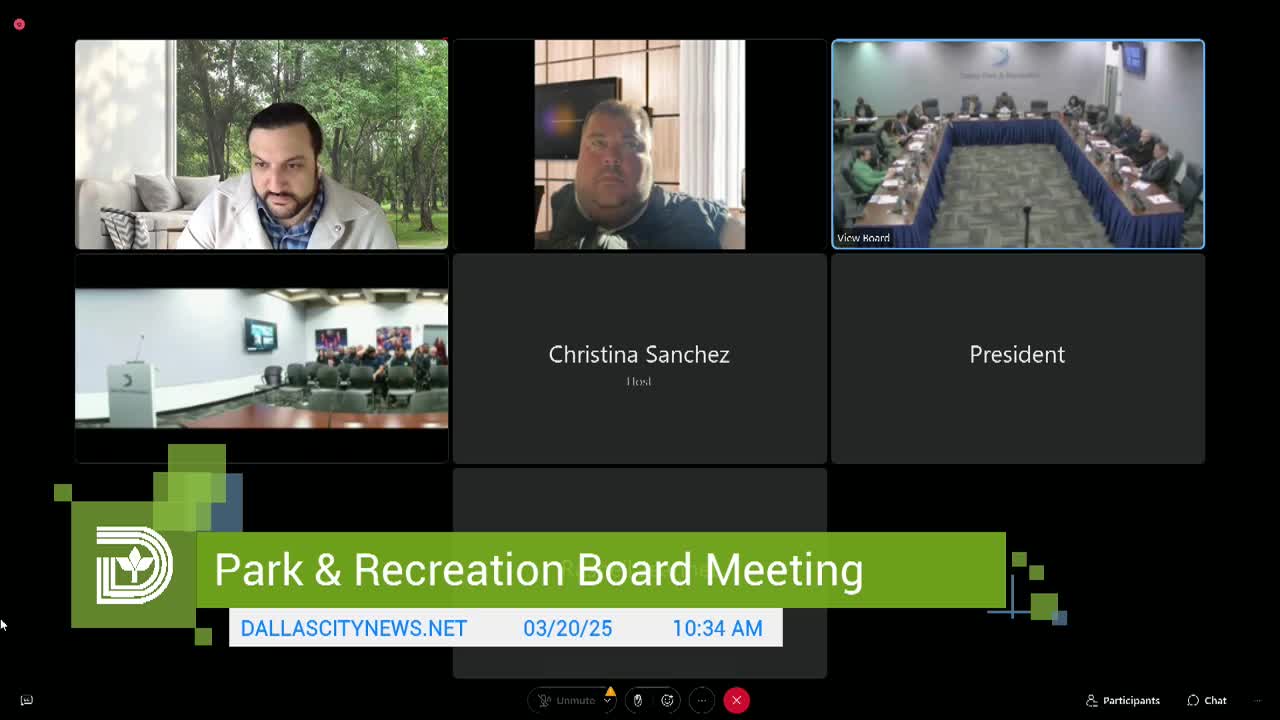Trust for Public Land outlines first five 'Greening Initiative' park sites; construction to begin June 2025
Get AI-powered insights, summaries, and transcripts
Subscribe
Summary
The Trust for Public Land presented schematics and a timeline for five pilot 'Greening Initiative' sites in Dallas, with construction expected to begin in June and per-site costs estimated under $550,000.
The Park and Recreation Board received a briefing March 20 from the Trust for Public Land (TPL) on the Dallas Greening Initiative, a program to convert underused, city-owned parcels into small public green spaces in neighborhoods with park access gaps.
Molly (Texas state director, Trust for Public Land) and Sofia Hernandez (TPL community engagement lead) described a community-driven design process that produced five site-specific schematics for properties in council districts identified as high-need. TPL and city staff said construction on the first site cohort is scheduled to begin in June 2025, with each site's estimated construction cost under $550,000.
TPL said the program focuses on city-owned land that is not currently in the park inventory — parcels that are not well suited for housing but can provide a park within a 10-minute walk for nearby residents. The first five sites were selected based on vacancy, urban heat island mitigation potential, proximity to park gaps and equity indicators. Partners include Dallas Water Utilities and the Dallas Public Library for a subset of the properties.
Sofia Hernandez described a three-meeting community engagement process that began with site introductions, progressed through conceptual options and culminated in pop-up events (in partnership with Better Block) that tested temporary activations and solicited real-time feedback. Designs for individual sites combine play areas, walking loops, shaded seating, native plantings, lighting and low-maintenance materials; TPL emphasized incorporating features that maintenance staff can sustain.
Funding and timeline TPL said the mayor committed $1.25 million in ARPA funding toward the cohort and that TPL will provide matching funds and additional fundraising. Park and Recreation staff said the department will lead construction and that TPL will provide match funding for the cohort; the first cohort of five sites is expected to be completed within 12–14 months of construction start.
Board reaction and next steps Board members praised the community process and urged staff to continue coordinating on maintenance plans, stewardship ('friends of' groups) and support documents for volunteers. Staff said they have set aside 10% of each site's capital cost for supplemental maintenance support and are developing materials to assist community stewards with programming and upkeep.
The board asked staff to return with procurement and construction methods for each site as documents move from schematic design into construction drawings and bidding. TPL staff said they plan to initiate cohort 2 later in 2025 once documentation is complete for cohort 1.
Quotes from the meeting "This project is helping us move the needle on park access," Ryan O'Connor said in introducing the briefing.
"We worked with nearby residents to test pop-up parks and incorporate community feedback into the schematics," Sofia Hernandez said.
What the board will watch for Staff will present procurement approaches and finalized construction budgets for each site as the schematic designs move into construction documents. Board members flagged maintenance funding, the long-term service-level agreements with other city departments (for parcels held by utilities or libraries) and stewardship capacity as items for continued oversight.
